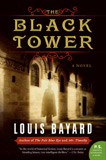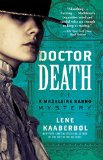Summary | Excerpt | Reading Guide | Reviews | Beyond the book | Read-Alikes | Genres & Themes | Author Bio

Literary chiaroscurist* Bayard's 1818 Paris, at the peak (or is
it the depth?) of the Restoration after the bloody Revolution, comes alive on
the page as Eugène François Vidocq, the father of modern police detection,
unravels a complex knot of crimes that could ultimately produce
Louis-Charles,
Louis XVI and Marie-Antoinette's young son, long thought to have died while
imprisoned in the Black Tower (part of the notorious
Temple prison in Paris) in 1795. If the person in question is indeed the
lost/reputedly deceased dauphin (heir to the French throne) he could displace
King Louis XVIII, threatenign his plans for the future of France.
Needless to say tensions run high as red herring after red herring gets thrown
into the path of forensic genius Vidocq. Beginning with the murder of an
unidentified man who was killed in an alley not far from the home that
26-year-old Parisian doctor Hector Carpentier shares with his widowed mother.
The dead man has a paper in his pocket with Hector's name and address written on
it. From the very first moment the brash, expansive Vidocq enters Hector's home
– helping himself to food and wine – he outdistances the hapless med student in
both wit and clarity of purpose. Granted, Hector hasn't a clue why this round,
foul-smelling man has invaded his home, but it seems futile to struggle against
a person who has so handily intimidated him. More clueless yet, Hector hasn't
the remotest idea why the dead man, later identified as Chrétien Leblanc, would
want to visit him.
 Wasting no time Vidocq, inspired by the real life Eugène François Vidocq who
founded the French Sûreté, sets out with Hector in tow to peel back the layers
of intrigue surrounding Leblanc's death. It is in the peeling back of these
layers where Bayard's skills as a storyteller shine and where the lights and
shadows of each character, of each facet of the plot, are displayed. For Vidocq
is not just a cop and Hector is not just a simple med student, and Hector's
relationship with his father – who had the same name – is not what he thought it
was. Nor was the senior Hector's life, as a physician-turned eyeglass maker,
exactly what everyone thought it was. To say nothing of Madame Carpentier, who
religiously polishes the dowry silver that represents a life she once thought
she had; or of Father Time, a boarder in the Carpentier house.
Wasting no time Vidocq, inspired by the real life Eugène François Vidocq who
founded the French Sûreté, sets out with Hector in tow to peel back the layers
of intrigue surrounding Leblanc's death. It is in the peeling back of these
layers where Bayard's skills as a storyteller shine and where the lights and
shadows of each character, of each facet of the plot, are displayed. For Vidocq
is not just a cop and Hector is not just a simple med student, and Hector's
relationship with his father – who had the same name – is not what he thought it
was. Nor was the senior Hector's life, as a physician-turned eyeglass maker,
exactly what everyone thought it was. To say nothing of Madame Carpentier, who
religiously polishes the dowry silver that represents a life she once thought
she had; or of Father Time, a boarder in the Carpentier house.
It is in these layers that Bayard not only fleshes out his characters but also
inspires questions – both plot-related and allegorical. What does Hector's
father have to do, if anything, with the sad story of the youngster,
Louis-Charles, so severely punished for the sins of his father? Why do so many
people seem hell bent on eliminating the younger Hector? Who is this Vidocq? And
what about "the strange mystique that surrounds him. He is considered apart
from everything, even the Prefecture that nominally employs him. The law is one
thing, Vidocq another"? What about Hector's relationship with his mother?
Ponder these questions regarding the plot and before long the reader is
pondering similar, metaphorical, questions in his/her own life. Do we really
know our fathers, our mothers? What do we really know or need to know about our
parents' dreams/disappointments? Does the persona we present to the world today
represent the sum of all we have been and done in our past? Or have we made more
of ourselves than a stack of personal experiences? Although the plot questions
are wrapped up as neatly as can be expected, given the speculative nature of
resurrecting a deceased king, the metaphorical questions remain.
Good books satisfy a reader's curiosity about plot points. Excellent books do
that plus they leave a reader with more, rather than less, to ponder about life
and the world we live in.
Damn you, Bayard, your book with all its questions will haunt me for a long time
to come.
*Chiaroscuro (Italian for light-dark) is the technique of using light and
shade in a painting to achieve a sense of volume, the same term can be applied
to films and photography. It can also be used to describe certain types of
wood block printing.
Image: An undated portrait of the real-life Eugène-François Vidocq.
The French Revolution & Restoration
Most readers will recollect the French Revolution of 1789-1799, during which
France was transformed from an absolute monarchy based on feudal principles,
with the aristocracy and Catholic clergy at the top of the heap, to a republic
of (theoretically) free and equal citizens. But some may have forgotten
the more than 80 years that followed that saw two restorations of the monarchy and two additional revolutions
before something resembling the France we know today hauled itself out of the rubble. In
brief:
![]() This review was originally published in The BookBrowse Review in October 2008, and has been updated for the
November 2009 edition.
Click here to go to this issue.
This review was originally published in The BookBrowse Review in October 2008, and has been updated for the
November 2009 edition.
Click here to go to this issue.

If you liked The Black Tower, try these:

by David Morrell
Published 2017
The notorious Opium-Eater returns in the sensational climax to David Morrell's acclaimed Victorian mystery trilogy.

by Lene Kaaberbol
Published 2016
From the coauthor of the critically acclaimed New York Times bestseller The Boy in the Suitcase, a "gripping plot" (Publishers Weekly, starred review) and captivating historical thriller.
Your guide toexceptional books
BookBrowse seeks out and recommends the best in contemporary fiction and nonfiction—books that not only engage and entertain but also deepen our understanding of ourselves and the world around us.